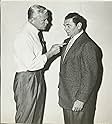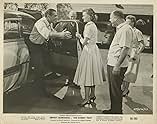Job or family? The perennial conflict is depicted in this drama about a draftsman able to free himself from the job for a very overdue family vacation, who is threatened with the sack if he ... Read allJob or family? The perennial conflict is depicted in this drama about a draftsman able to free himself from the job for a very overdue family vacation, who is threatened with the sack if he doesn't return to work mid-holiday.Job or family? The perennial conflict is depicted in this drama about a draftsman able to free himself from the job for a very overdue family vacation, who is threatened with the sack if he doesn't return to work mid-holiday.
- Awards
- 1 win total
Paul Bryar
- Bus Driver
- (uncredited)
Peter Mamakos
- Truck Driver
- (uncredited)
Nora Marlowe
- Bus Passenger
- (uncredited)
- Director
- Writer
- All cast & crew
- Production, box office & more at IMDbPro
6.4267
1
2
3
4
5
6
7
8
9
10
Featured reviews
Adult responsibilities--and the parental guilt that sometimes goes with it
Ernest Borgnine is excellent as a husband and father whose long-awaited camping vacation with his family is cut short after his boss orders his return to the office; Borgnine's little boy is upset they left a rabbit trap behind, and is angry with his father for not caring about the potential death of an animal versus the demands of his job. Screenwriter J.P. Miller, adapting his 1955 teleplay, broadcast as part of the Goodyear Playhouse, is a bit too obvious drawing out the parallels between the man's position at work and the caged rabbit; but, even as the symbolism is beaten to a pulp, the star's performance carries the material. This project was clearly meant to get Borgnine back on "Marty" territory; while "The Rabbit Trap" isn't nearly as rich in personality as that film, it certainly has its heart in the right place, and Borgnine's confrontation scene with his hard-nosed boss is pretty powerful. ** from ****
Family and Morals versus work and promotion
A family that just has started their vacation, must return home because the father (Ernest Borgnine) is required by his boss. When they arrive, realize that they forgotten a harmless rabbit trap ready. Because of the insistence of his son, he try to convince his boss to let him go to the vacation spot to check whether any rabbit has been caught, and so release him from a slow death agony. He must choose between his job, or give a good example of compassion and love to all creatures to his son. The Ernest Borgnine acting is at his best. I love this film.
The problems of little people. Very little people
Adapted from a '50s TV drama, this United Artists release stars Ernest Borgnine, at the height of his Everyman abilities, as a family man torn between home and work responsibilities. His boss (David Brian, good) is a slave driver who knows how to exploit his cooperativeness, and his wife (Bethel Leslie, also good) keeps talking sense to him, knowing he's disinclined to listen. When he's called back to work prematurely from vacation and forgets to dismantle the rabbit trap he and his young son set up, the son worries about the suffering rabbit and tries to travel back to the lake on his own. Yes, the movie's really that small. There's a subplot about a va-va-voom but nice secretary who's having an affair with the boss and feels guilty about it, and there's a happy ending that really isn't very happy. And there's annoying, TV-sounding music throughout, and some dull shots of L.A. and environs in 1958. It's well intentioned and reasonably well executed, but also prosaic and up to its neck in the Everyday Problems of Normal People. That's generally not a recipe for exciting cinema.
David Brian made this film compelling
While everyone else seems rudderless and flip-floppy, David Brian is unbeatable as a driven businessman with a complex compassionate side but who also knows his boundaries. worth a watch just to see how he handles his role.
6.5
6.5
A Short, Fun, Family Film
A family goes on vacation when the father's boss calls and wants him to come back early. Hoping this is his chance at promotion, he does. But they forgot that a rabbit trap was set and the son now worries about the fate of any rabbit caught in it.
It is nice to see a young Ernest Borgnine. He somehow looks less goony. And he makes a nice father, even if the "Nevada Slim" reference is lost on me.
The film is very sentimental and touts family values as being more important than work. It is a tough film if you look at it realistically, because of course to have a functional family, you need to have some sort of income. But the message is still important if not taken too seriously, and the film could have gotten more sentimental than it did (for example, if the boss took Borgnine's side), and I am glad it did not.
It is nice to see a young Ernest Borgnine. He somehow looks less goony. And he makes a nice father, even if the "Nevada Slim" reference is lost on me.
The film is very sentimental and touts family values as being more important than work. It is a tough film if you look at it realistically, because of course to have a functional family, you need to have some sort of income. But the message is still important if not taken too seriously, and the film could have gotten more sentimental than it did (for example, if the boss took Borgnine's side), and I am glad it did not.
Did you know
- TriviaDon Rickles' second movie.
- GoofsWhen Eddie (Ernest Borgnine) pulls into his driveway returning from the family vacation, it's clear that nobody else is in the front seat where his wife Abby (Bethel Leslie) would be sitting, but after the car stops, Abby opens the passenger door and emerges from the front seat.
- ConnectionsRemake of Goodyear Playhouse: The Rabbit Trap (1955)
Details
- Release date
- Country of origin
- Language
- Also known as
- Die Kaninchenfalle
- Filming locations
- Production companies
- See more company credits at IMDbPro
- Runtime
- 1h 12m(72 min)
- Color
- Aspect ratio
- 1.66 : 1
Contribute to this page
Suggest an edit or add missing content




























